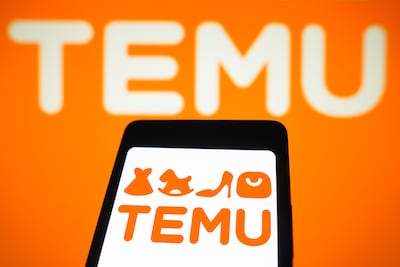“Temu is riddled with spyware, run for your life.” I may be slightly paraphrasing the endless online overreactions to the Chinese e-retailer’s recent dunking in hot water, but it was enough to catch my eye. Enough even to avert my attention from spinning the app’s coupon wheels and question the risks of trading my (digital) soul for a Dh2 garlic crusher.
For the uninitiated, Temu (pronounced “tea-moo”, according to YouTube videos bidding to end the “teh-mew” debate) is a fast fashion and homeware gadgets e-commerce emporium. If you haven’t been sucked in by the “gamification” tools offering discounts, it's likely you've seen its bright orange logo littering the web.
In just a few years, it has become a £27 billion (Dh124 billion) sales behemoth, moving out of the shadows of Shein and kneecapping the likes of Boohoo and Asos. It flogs household items for a fraction of the price of others, even managing to outfox Amazon, the pioneer of low-cost online retailing. “When prices look too good to be true, it’s probably Temu,” says the wife. Its tagline is “Shop like a billionaire” and it has thrived during a cost-of-living crisis when people want cheap.
In recent days, it has faced backlash in the UK and France after a promotional campaign that promised users up to £100 (Dh461) for signing up and getting a friend to do the same. And on a site where dresses can go for as little as Dh10, it spread like wildfire.
At the same time, reports emerged that, buried within the T&Cs, was permission for the company to publish users' “photo, name, likeness, voice and opinions” for advertising or promotional purposes.
Internet safety and discount nirvana
Cue the uproar, the great division of the internet courtesy of the talking hotheads and, ultimately, the U-turn. The company later “tweaked” those terms because they were “overly broad”. And cue my obligatory shrug and eye roll as an indifferent social media user and, well, a grown-up.
I understand, and have previously written about, the dangers of the internet. The risk of deep fakes, the jailbreaking of bank accounts, the this, the that. On the perils go. But what am I supposed to do? Stop using the internet and go outside where there are people and queues and staff to judge my shopping basket? I don’t think so.
Yes, there is a cost to using the internet, so the price I pay might as well be whatever’s cheapest. I weigh up the value. And take responsibility for my own safety procedures, of which there is a litany of protocols to follow.
But, back in the real world, I come from a long line of bargain hunters. And this is discount nirvana. I still raid supermarket shelves for end-of-the-day yellow sticker markdowns, aka “the whoopsie aisle” as it will be for ever known in our household.
When Dh1 flossing sticks, Dh5 heart-shaped egg moulds or Dh7 Donald Trump socks (complete with 3D furry ginger quiff) call, I’m not pontificating about if or how my data may be harvested, cajoled and manufactured into a commodity to sell to the highest bidder.

I’m there, MySpace profile picture from 2007 at the ready. When I need to drown out the wife’s cacophonous snoozing, there’s a snoregasbord of earplugs waiting for me. Starting at Dh1.34.
When she snipes back and points out I dress like someone who’s lost a bet, I’m trawling the “trendy waffle shirts” for under Dh20. My only rule is to stay away from electronics, I almost lost an eyebrow to a mini disco ball once.
Many internet sleuths yell: “Bro, it's literally state-linked spyware,” in all caps, to prove their rationality. And while I could get into a rip-roaring game of one-upmanship with a stranger on X/Twitter, I am an adult, so I should stick to choosing whether to buy a Dwight Schrute birthday card or a bucket hat covered in rubber ducks.
Anyway, fears about data use or abuse are not contained, allegedly or otherwise, to e-commerce platforms. It’s been going on long before Temu appeared in 2022. Forget closing the barn door, the horse bolted two generations ago.
The only way to properly protect my data and surf a “world wise web”, is to not surf at all. Unplug and go analogue. Join the actual billionaires in their doomsday bunkers. But even then, the ghost of wish lists past will still linger somewhere in the ether. Can I really be bothered, or have the temerity, to track it all down and request tech firms delete it? As a man fawning over Dh3 rice strainers at 1am, it’s unlikely.
Weighing up the cost of privacy and price
I sign in with a Facebook account older than the dinosaurs. Whatever data I share with them, I share with Temu. So why the hoo-ha? Not because Facebook wears its data-protecting halo unblemished, we know.
There is a near-endless list of companies, institutions and governments that have, keep and, yes, sell my data. Email accounts, work and personal, stored. Bank accounts and every transaction from every company and country, stored. MSN account chat logs aged 11, hopefully not stored, probably definitely are. We all know it, how many more Edward Snowdens, Julian Assanges or other cypherpunks do we need before reality sinks in?
It’s the internet. Don’t trust it. And if you want to bury your head in the sand and delegate your own safety to tech companies, then at least do so with some Dh7 fuzzy Trump socks showing.


